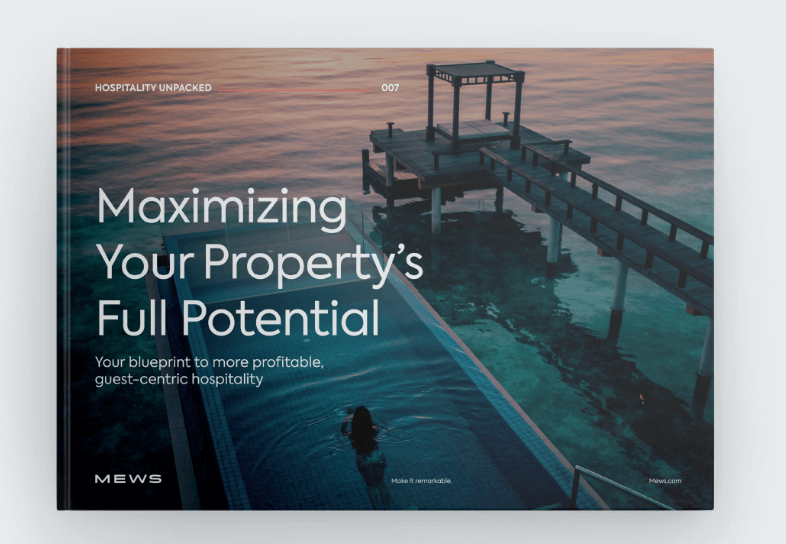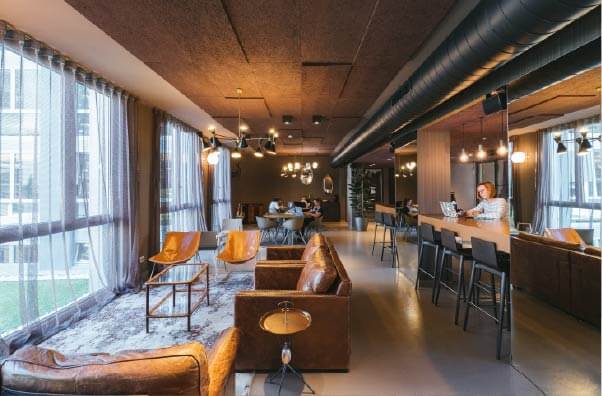As the travel paradigm changes, your hotel has to be adaptable and tailor its offer to the changing needs of your ideal target audience. This is why hotel coworking is an interesting proposal in order to diversify your business offer, piggyback on the bleisure travel trend and attract digital nomads. As traveler profiles change and develop, it's important that the modern hotelier adapts too in order to remain relevant.
There are many factors to consider when deciding whether a coworking space is right for your property, which we’ll look at in more detail in this article, as well as the important factors to consider for these types of coworking spaces. So, let's dive in.
Table of contents
Why should hotels consider creating a coworking space?
Day-use rooms, early check-ins, meetings, long stay accommodation, and events are all ways to generate more revenue, but coworking proves a popular solution because it's a service that can be offered all year round. Plus, it doesn’t require a lot of extra infrastructure, just a re-ordering of your public spaces, some extra plugs and a strong Wi-Fi connection with extra bandwidth.
As the way we work and travel changes, hotels must adapt in order to remain competitive, and offering coworking space proves an attractive solution for maximizing your property’s full potential. Offering coworking space is a great way to cater to locals and therefore create alternative revenue streams in off-season. Tapping into the local community is a great strategy to ensure profitability and encourage word-of-mouth marketing.
What are the factors to consider for hotel coworking spaces?
There are many factors to consider when it comes time for your hotel to set up coworking spaces, which we’ll take a look at in more detail below.
1. Rent individual spaces and increase revenue
Increasing profitability is about recognizing that each room and space in your hotel is prime real estate. That means that the more of your hotel’s real estate you can capitalize on, the more revenue you will generate on a daily basis, and the more you can diversify your income, becoming less reliant on occupancy rates.
In order to make profit from individual spaces, it’s important to have a property management tool that allows you to sell different services at different rates while using the same booking engine. With Mews, you can create office spaces or desks with their respective prices that can be booked through the same booking engine that guests use to book their hotel rooms, allowing for more accurate reporting, and the ability to analyze profitability better.
2. Large rooms or function rooms can be used as meeting rooms
Your coworking space doesn’t have to be limited to the lobby or bar. Large rooms, suites and function rooms can double up as meeting rooms, especially when they are not being used. This is a great way to optimize the use of these larger spaces, which are likely not occupied on a daily basis. These spaces can also be used by local businesses that are looking for a place to host meetings and even training.
It’s also important to ensure that those who rent space have a place to have a video call in silence. You can use smaller unoccupied hotel rooms for meeting rooms that can be booked by the hour, in hours that it wouldn’t otherwise be occupied by hotel guests.
3. Complement coworking with other services
Your coworkers are the perfect clients to offer complementary services to. If you have a restaurant or a bar, you may consider including lunch or coffee in the price and upselling these services. Your coworkers will need to eat and will want an afternoon pick-me-up so ensuring that you have these services are readily available will make it easier to boost their average spend. Find out more about upselling.

4. Keep in mind the needs of different target groups
Not all customers are created equal, and you need to be sure that your coworking offering has a rate to suit all the possible needs. There may be digital nomads that are looking for not only a place to work, but also long-term accommodation. Or these same digital nomads might already have accommodations but are in need of a place to work. You should be sure to keep in mind these needs and design a pack to suit them. Learn more about digital nomads.
Another potential profile could be a local who is sick of working from home and is looking for a nearby place to work remotely from. Whether they’re searching for office space on a sporadic basis, regularly, or on a daily basis, make sure you have an offer designed for all of these different potential needs. In other words, a day-use rate, a weekly, monthly or even yearly rate. The more possibilities you offer, the wider range of target groups you will attract.
You may also like:
5. Consider the infrastructure needed
As mentioned previously, many hotels are already set up for success because they have space, staff, time and the means to create coworking space with little extra effort. Nonetheless, it’s important to consider some basic infrastructural musts.
Some of these musts include a bathroom, adequate plugs for charging laptops, meeting rooms (small will do for one-to-one video calls, but larger rooms will be needed for in-person meetings), access to water, coffee and tea (whether it’s included in the daily rate or not is up to you), a place to get food or snacks or to eat a packed lunch, and comfortable tables and chairs to make your hotel a pleasant place to work from all day.
6. Design a promotion plan
Once your hotel decides to create a coworking space, the strategies you use to promote it will be important. You want to attract as wide of an audience as possible, whether that be digital nomads, remote workers, hotel guests, and local businesses, so consider having a promotion plan designed for each of the target groups. Figure out how you will reach them and what you will offer them that will set you apart from the competition.
Most importantly, you should answer these questions:
- Why should someone cowork from your hotel?
- What will you offer them that is different from the competition?
- How can you keep people coming back?
Conclusion
In this article we’ve looked at six of the most important considerations for designing hotel coworking spaces such as renting individual spaces to increase revenue, doubling up large rooms as meeting rooms, complementing your offer with auxiliary services, considering the infrastructure needed, creating a promotion plan and designing different offers to suit different needs.
By keeping all these things in mind, your hotel coworking can become a powerful source of ancillary revenue that will increase your hotel’s bottom line, make it more competitive, decrease dependency on room rates and occupancy, and make your hotel profitable year-round.
Download our guide "Maximizing your property's full potential"

If you are looking for more tips to use your hotel space to maximize revenue by diversifying your revenue, download our guide to maximizing your property’s full potential. You will find all the best tips not only on how to increase your revenue but also to modernize the guest experience. Don’t miss your chance to take your hotel’s profitability into your own hands.

Author
Eva Lacalle
Eva has over a decade of international experience in marketing, communication, events and digital marketing. When she's not at work, she's probably surfing, dancing, or exploring the world.

Essential hotel technology for general managers
Download now
Hospitality hot takes straight to your inbox


.webp)